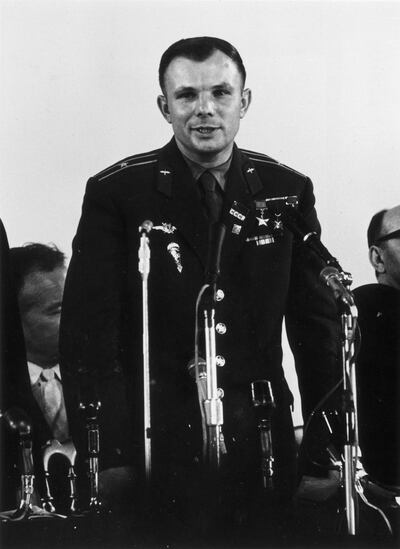April 12 is a milestone date for the global space sector - and the UAE's very own history-making astronaut Hazza Al Mansouri.
Not only does it mark the 59th anniversary of when Yuri Gagarin became the first man in space in 1961, but it is the day that Maj Al Mansouri discovered he would be following in his illustrious footsteps.
At a young age of 27, Gagarin blasted off into the skies on board the soviet spacecraft, Vostok-1, and circled earth for 108 minutes – paving the way for future adventures among the stars.
Maj Al Mansouri etched his own name in UAE folklore last September, when he spent eight days on board the International Space Station.
Speaking to The National, Maj Al Mansouri said the date of April 12 is significant to him as he reflects on being his country's first astronaut in space.
“In 2019, it was the day when it was announced that I would carry the UAE flag to space,” he said.

Maj Al Mansouri lifted off into space on September 25 and returned to Earth on October 3, via Russia’s Soyuz spacecraft.
“This year we are celebrating the day with our astronaut corps and the announcement of the search for the second batch.
“Our journey doesn’t stop here and in the future we hope for more missions. We hope to be part of the direction the international space community is heading towards, whether that is the Moon and Mars.”
The UAE already has plans in place to reach Mars. In July, the country will launch its unmanned Hope probe to Mars in efforts to collect data on the Martian atmosphere.
The Mohammed bin Rashid Space Centre is also working towards building a Mars scientific city, which replicates living conditions on the red planet. This is to ensure they are ready to build an entire city on Mars by 2117.
“It’s (UAE’s space journey) going in a good direction, despite what is happening now,” said Maj Al Mansouri.
The coronavirus pandemic has not put a stop to the burning desire to explore space. On April 8, the Soyuz MS-16 crew, two Russian cosmonauts and an American astronaut, lifted off from the Baikonaur Cosmodrome to the ISS.
However, only space officials and close family members in mandatory protective wear were present during the launch day. Media and tourists were banned in order to contain the spread.
Salem Al Marri, the head of the UAE Astronaut Programme, said work on the ISS has to continue despite the conditions on earth.
"When you look at the ISS, it's a wonderful machine but it's something that has to function no matter what is going on," he told The National.
“If you don’t have crews up there doing the science and the maintenance, there’ll be an issue. When there are any disasters on Earth, you still see astronauts working on the ISS.”
Mr Al Marri said it is “only the beginning” for UAE’s space journey, as the country is already working towards increasing its astronaut corps.
By January, 2021, the names of the nation's next two astronauts will be announced and they will join Maj Al Mansouri and Sultan Al Neyadi, who was the back-up astronaut in UAE's first mission to space.
“Since 1961, only about 560 people have gone to space and when you look at that over a 60 year period of time, that’s a very small number of people,” he said.
“It’s still a unique, challenge and costly field that is difficult to do. The UAE joining that club of nations (that have gone to space) is all something we should be proud of. A message here is that we are here stay and we’ll be doing more, hopefully."


